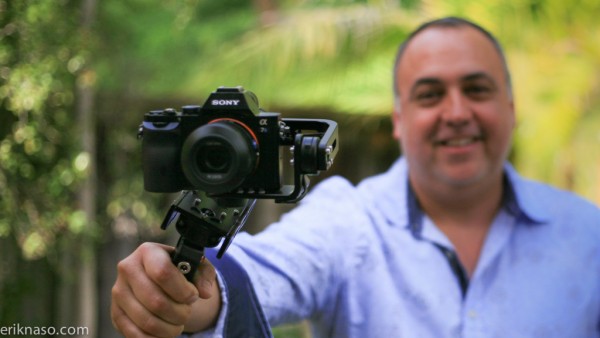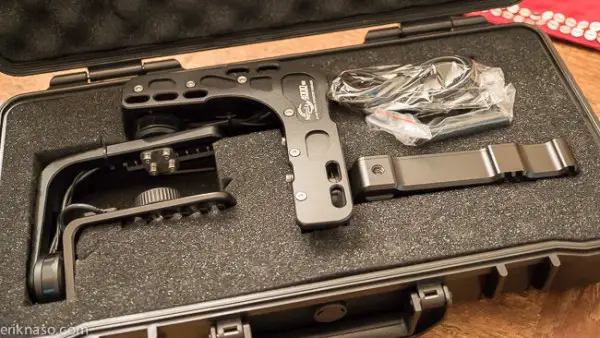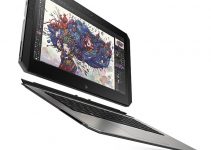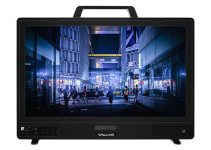Getting stable and fluid footage from inexpensive gear has long been desired by filmmakers on a budget. Up until recently there weren’t many viable options that offered this, so you either had to go the DIY route, or save up enough money to buy a Steadicam-type stabilising device, and the good ones usually cost well over $1,000. The Nebula 4000 Lite from FilmPower is a relatively new device, which is quickly becoming a very popular and inexpensive gimbal for GH4 and Sony A7s shooters. The pistol grip design combined with the 3-axis gimbal stabiliser makes for a compact and portable package for small foot-print cameras like the above mention as well as the Lumix LX100, the Sony RX100 Mark III, the Blackmagic Pocket Cinema Camera, GoPro Hero4 and anything else up to 1 KG/2.2 lbs. The compact gimbal currently sells for $699.

Image credit: Erik Naso
Here is a brief rundown of features and specs:
Features:
- Full metal precision CNC construction and design
- Compatible with GoPro 3/3+ all Hero4 models and older models
- Supports camera/lens combos up to 2.2 lbs/1KG – Sony A7s, GH4, BMPCC
- 3 x Operating Modes – Follow, Semi-follow, and Locked mode
- Bluetooth control and tuning via Android on both Mac and PC
- Comes with a protective hard case with custom cut-out foam
Specifications:
- Dimension: 353 x 196 x 78mm
- Weight: 800g (1.76 lbs)
- Load: 1kg (2.2 lbs.)
- Total height: 230mm
- Handle height/width: 121mm/50mm
- Top height/width: 110/110mm
- Built in Battery: 11.1V mAh
- Battery Duration: 2 Hours

Image credit: Erik Naso
Erik Naso has received his review unit, and shared his initial findings on his blog. Even though the Nebula 4000 can be used out of the box delivering decent results, the custom software for the PID settings allows for further tweaking.
As with most gimbals, balancing the camera innitially on the gimbal is key to getting stable footage. Fine tuning via the software, is not mandatory, but preferable if one is running into issues with the motor vibrations or the camera not balancing correctly (after manual balancing on each of the 3 axis has been done to the best of one’s ability of course).
Overall, his impression of the Nebula 4000 is positive, even though the testing unit he had couldn’t get to talk to the software for some reason. Balancing the A7s on the Nebula 4000 required a bit more work than balancing on the DJI Ronin, however, if one gets that right, the stock motors are pretty good out of the box, so one can start flying around with the gimbal right away without further tweaking via the software.
He did also notice the battery life was not very good, due to a possibly defective unit he got sent. Here’s Erik in his own words describing his innitial experience with this gimbal:
The Nebula 4000 Lite is an innovative tool that strips away the frame and puts the gimbal in the palm of your hand. If you use it correctly by not trying to move too fast you can get amazing results. It does have a tendency to bounce if you walk to fast but then again so does the bigger ones on the market. practice and plan your shots and you will get great results.
If you have a Fig Rig or other pieces of kit laying around for a DIY approach you can take out a lot more of the walking bounce. Adding that second point of contact really helps stabilize the gimbal and also makes it easier to use since you don’t have to hold it with one hand.
Mine was a lemon. No doubt about it and it happens with all products. Maybe it was put together on Friday at 4:45pm. Who knows. It failed on several levels and so it’s hard for me to recommend because of that. On the other hand Dave and several others that have the Nebula 4000 Lite haven’t experienced any issues at all. The software works and battery life is as expected. In fact they love this thing! I would really like to get another one to test out and use. I really had very little time before the review unit stopped working.
It didn’t completely die but yes the battery issue was keeping me from taking it out for a day of shooting. The tests I did do around the house impressed me. What little time I had I enjoyed and see how cool this could be as a production tool and this is the first generation. I’m sure we will see improvements. I want to stress how good the settings are out of the box for amuture filmmakers that dont want to go too deep into PID software. With a good balance setup you will get good results. With tweaking it could be amazing.
Erik came up with a really neat idea to place the Nebula 4000 inside a Fig Rig – allowing for two hand operation to relieve stress and fatigue out of the one-hand pistol grip operation normally required, as well as help out with the unwanted “bumpy”-ness in the footage when walking. Check out his video below:
For Erik’s full write-up on his hands-on with the Nebula 4000 Lite head over here.
Dave Dugdale from LearningDSLRVideo.com has also recently been testing his Nebula 4000 Lite unit and has posted some really nice footage, which you can see below.
Dave also has a very informative video on setting up the Nebula 4000 Lite and a lot more cool stuff over at LearningDSLRVideo.com
The Nebula 4000 certainly seems like a no-brainer for small cameras, and even though it may require some work to get the balance right, from the videos above, we can see it can delivery really good results. I was on the fence about picking one up, but just the price alone (not to mention the form-factor), and the helpful videos from Erik and Dave have helped me decide to pick one up. Stay tuned for more.
[via Erik Naso]
Disclaimer: As an Amazon Associate partner and participant in B&H and Adorama Affiliate programmes, we earn a small comission from each purchase made through the affiliate links listed above at no additional cost to you.



